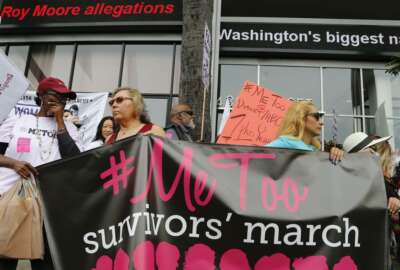
Intelligence community women join the #MeToo movement
Some women who hold or have held senior positions at the State Department and Defense Department are speaking out against sexual harassment.
The #MeToo revolution has emboldened women across some of the most powerful industries to step forward and stand up for equal treatment, and the intelligence community is no different.
More than 200 women in the national security community signed a letter demanding action to reduce the incidents of sexual harassment and abuse in the workplace.
“Diplomats and civil servants, defense civilians, members of the military, development workers, and the locally employed staff workers and contractors who support them brave challenging, at times life-threatening, conditions. Our commitment leads many of us to spend extended time away from our families and loved ones in war-zones and hostile locations in service of our nation. We, too, are survivors of sexual harassment, assault and abuse or know others who are,” the Nov. 28 letter stated.
The letter had one simple message: “It’s time to make it stop.”
Signed by top ranking women like Ambassador Gina Abercrombie-Winstanley; Wendy Anderson, the former deputy chief of staff to the defense secretary; and Nora Bensahel from the Atlantic Council; the letter calls for specific solutions to deter sexual harassment.
“The institutions to which we belong or have served all have sexual harassment policies in place. Yet, these policies are weak, under-enforced and can favor perpetrators,” the letter stated.
The women call for clear leadership from the very top that sexual harassment and abuse in the workplace is unacceptable.
The women want mandatory exit interviews for all women leaving federal service, the creation of multiple private channels to report abuse without retribution, external mechanisms to collect data on claims and publish them and regular mandatory training for all employees.
“This community must also address the serious gender imbalances in senior leadership positions because male-dominated teams have been found to be more prone to abuses and more diverse teams are consistently linked to better outcomes. And we want to see leaders and managers across the national security community held accountable for creating, nurturing and enforcing a workplace culture that respects and includes women as equal peers and colleagues,” the letter stated.
While women in the IC are taking a more public approach toward sexual harassment, women in the military have relied on lawmakers to be their champion.
Sen. Kirsten Gillibrand (D-N.Y.) has been trying to keep military sexual assault in the spotlight.
“Despite years of congressional reforms, our men and women in uniform still do not have confidence in the military justice system,” Gilibrand said in September. Fewer sexual assault cases are going to trial and those that do are generating fewer convictions, the AP reported.
Gillibrand, a member of the Senate Armed Services Committee, examined internal legal documents from 238 sexual assault cases that were adjudicated in 2015 at four of the largest military installations in the United States: the Army’s Fort Hood in Texas, Naval Station Norfolk in Virginia, the Marine Corps’ Camp Pendleton in California and Wright-Patterson Air Force Base in Ohio.
In what she described as a shocking outcome, Gillibrand said there were no examples in the records from those bases of disciplinary action being taken against anyone who retaliated against a person who reported a sexual assault. She said that conflicted with Pentagon surveys that found more than half of all victims across the vast Defense Department enterprise experienced negative reactions or reprisal for their complaints, the AP article stated.
Read more of the DoD Personnel Notebook
Copyright © 2024 Federal News Network. All rights reserved. This website is not intended for users located within the European Economic Area.
Scott Maucione is a defense reporter for Federal News Network and reports on human capital, workforce and the Defense Department at-large.
Follow @smaucioneWFED




